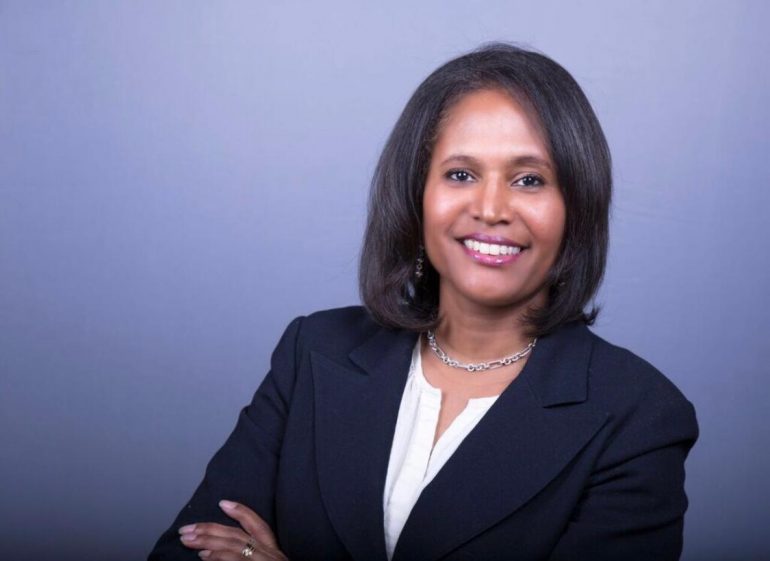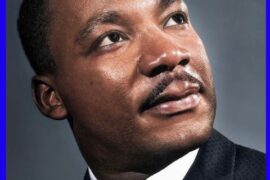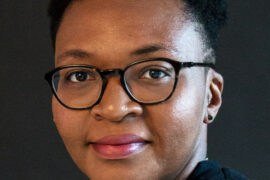Alderman of the 4th Ward since April 2016, Sophia King grew up in Evanston, Illinois. Her family hails from the Mississippi Delta, so as a child and young adult, she spent considerable time in that state. When her mother was accepted into Northwestern University in Evanston, the family moved to the Chicago area.
King has a Bachelor’s Degree in Chemistry from the University of Illinois and earned her Master’s in Education and Social Policy from Northwestern University. She taught chemistry at the Latin School and helped found Ariel Community Academy in the North Kenwood-Oakland neighborhood with Ariel Investments CEO Mellody Hobson.
A small business owner in the 4th Ward for five years, King was also a member of the It’s Time Organization that worked to prevent gun violence. She founded the non-profit Harriet’s Daughters to increase employment and wealth in the Black community.
Mayor Rahm Emanuel appointed King to the 4th Ward aldermanic seat in April of 2016 to succeed Will Burns, who resigned to pursue a business opportunity. She won the seat in a special election in 2017 and is now running for re-election on February 26. The 4th Ward includes Bronzeville, Hyde Park, Kenwood, Oakland and part of the South Loop.
King has been married for almost 30 years to attorney and Chosen Few DJ, Alan King, and she has been the primary organizer of the Chosen Few annual music festivals. The Kings are parents of two adult daughters. N’DIGO spoke with King recently about her bid for re-election.

N’DIGO: You have lived in the 4th Ward since the late 1980s. How has the area changed between then and now?
Ald. Sophia King: I first moved to the Bronzeville area in the late eighties, when I moved to Prairie Shores after college. Both of my kids were actually born at the Michael Reese Hospital nearby. Then, Prairie Shores had a grocery store (Mr. G’s), restaurant and other amenities. The old Michael Reese is now the site of a major development.
I moved to the Kenwood area in the early 1990s. As I think about it, the most striking change in the area has been the redevelopment of the 47th Street Corridor. Since the 1990s, there has been a lot of positive change in the area. During that time, 47th Street was known more for two notorious liquor stores in the area, Gills and Pappy’s Liquors, than anything else. Gills even had a drive through window for their business, if you can believe that.
The old Shakespeare Elementary was still open, but not educating our kids well. In fact, I helped found the Ariel School, which is a neighborhood school that currently resides in the former Shakespeare Building. The corridor is now starting to reflect the desires and values of the residents of the area that are seeking more amenities for their entire families.
Close to where Gill’s used to be, a mixture of locally owned establishments such as Little Black Pearl, which just opened a small café on 47th Street, and national brands like Ross, that offer apparel options that previously weren’t seen in the area 20 years ago, are now growing. Further to the west on the corridor towards Cottage Grove where Pappy’s was located, the Shops and Lofts on 47th Street development has really transformed the narrative of what is possible on that end of the corridor.
Although these developments have transformed the corridor for the better over the last couple of years, I know that residents want even more. Working with Quad Communities Development and other stakeholders, I am making sure we increase the diversity of businesses in not only Kenwood, but in the Bronzeville community as well.

What are the ward’s primary challenges and what are you trying to do about them as alderman?
Jobs, good neighborhood schools and public safety are among the most pressing concerns we face as a community. Mental health, how we engage our youth and elders, are also important to a strong ecosystem. We need to make sure that we continue to bring jobs and economic development to under-resourced communities.
And we must continue to find opportunities to hire and train our most vulnerable populations. I am mindful of local hiring as development comes into the community. I am also committed to true parity and opportunity in contracting and senior level positions.
As alderman, I sponsored and passed an ordinance that shifts the way that we look at minority participation on city contracts. It adds a bid incentive for companies that have a diverse workforce. This is important because people have abused the system that gives preferences for minority ownership with front companies and businesses that don’t hire a diverse workforce.
This change is crucial because it will give priority to firms that truly value diversity and help put our community back to work. In addition, we are providing guidance on inclusion for development and construction that happens in the ward.
4400 Grove, formerly known as Washington Park Court, is a prime example of our efforts to make sure that there is parity and equity in projects taking place in the 4th Ward. The new mixed-use development on the 4400 block of South Cottage Grove will bring 162 additional housing units and much needed retail/commercial space to the community, but it will also bring jobs.
The project pairs a majority firm with an African-American owned general contractor, and it will have a significant number of Minority Business Enterprises (MBEs) as subcontractors. Last reported, 79 percent of the subcontractors are minorities, and 69 percent are African American-owned firms. The firms are committed to having a workforce that reflects the community and the developer is partnering with Bright Star for community hiring.

In addition, we are dedicated to working with the community and its many self-made leaders to promote our neighborhood public schools, and in turn, our youth. We are building stronger co-curricular programming in the 4th Ward, providing much needed relief to kids and their families who need options to keep students off the streets and in school.
As co-founder of Ariel Community Academy in the North Kenwood/Oakland area, I have learned a great deal about the challenges and triumphs of our city’s educators and their students. We were also able to create an internship program at Dunbar High School to help provide a stronger pathway from education to apprenticeship to jobs, and to work with the local unions to that end as well.
We have brought millions of more dollars to our neighborhood schools, including a new field and HVAC system at Kenwood, and re-opening the pool at Dyett, and have connected our schools with resources in the community by providing summer internships and apprenticeships at Dunbar.
We will continue to look for ways to strengthen our neighborhood schools. Families choose communities because of strong schools. Density brings neighborhood amenities and stimulates economic development. Residents with options are leaving the city and seeking better public safety and better resourced public education. To stem this tide, we must aggressively focus investment in neighborhood schools and traditionally disinvested areas.
Safety in our neighborhoods will require the cooperation and participation of all community members, from law enforcement to the local neighborhood watch. We are working with the community to shut down problem businesses and buildings, along with advocating for more resources and accountability. We are also looking at this issue comprehensively and bringing jobs, beautification, improved infrastructure and development to the community.
Finally, we need to look to create long term, sustainable, progressive revenue streams in order to fully fund education, vital city services and pensions. My legislative priorities will continue to be to bring parity to how we prioritize and spend precious city resources, including jobs. I will also continue to focus on ensuring that our neighborhood schools’ curricular and co-curricular programs are funded, and that our communities are safe.
What impact, positive and negative, do you believe the Obama Presidential Library will have on the 4th Ward?
The Obama Presidential Center is a once in a lifetime opportunity that will have profound benefits on the entire South Side. President Obama and his team have committed to hiring goals that will exceed city requirements, are committed to hiring many local businesses and residents, and are committed to working throughout our local community to provide positive educational resources and experiences for youth.
Do you think residents of the ward will be displaced by the presidential library?
Because this is in the 5th Ward and not the 4th, my understanding on the implications of the library is somewhat limited. However, displacement is always a concern when considering a new development in the community, but I think it is also an opportunity to discuss and plan deliberately for affordable housing in the community.
The city has an opportunity to mitigate displacement and add affordable housing because it owns a lot of the land in the adjacent community. We are trying to mitigate that type of impact in the 4th Ward by empowering the community to build within itself through community land trusts, which leverage the equity in the vacant lots.
If the community builds its own development, it can use the profits normally taken out of the community to reinvest. The city can also then require a large percentage of the new housing to be affordable. We are partnering with GN Bank, formerly Illinois Service Federal, on this initiative.
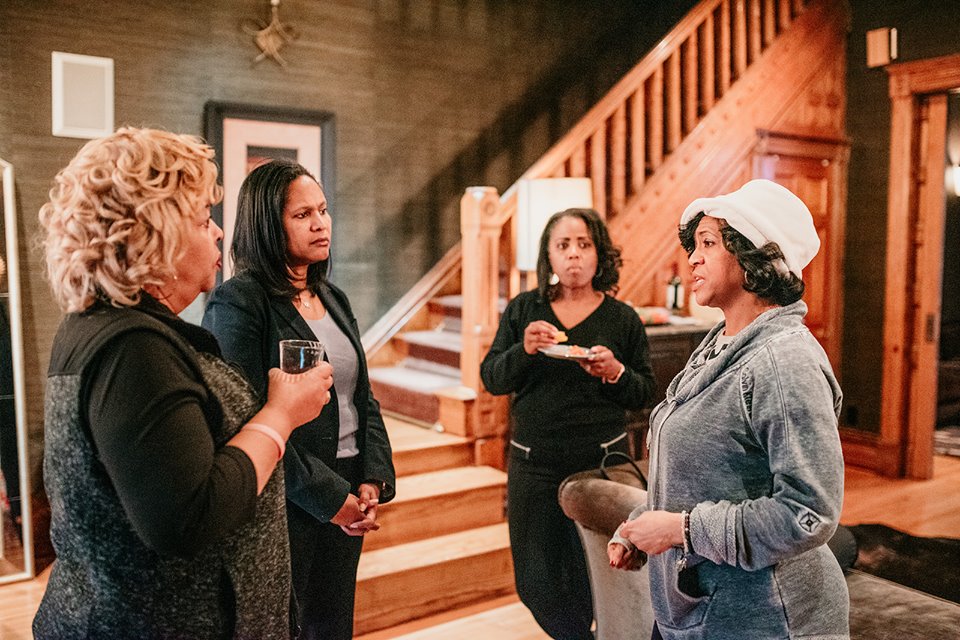
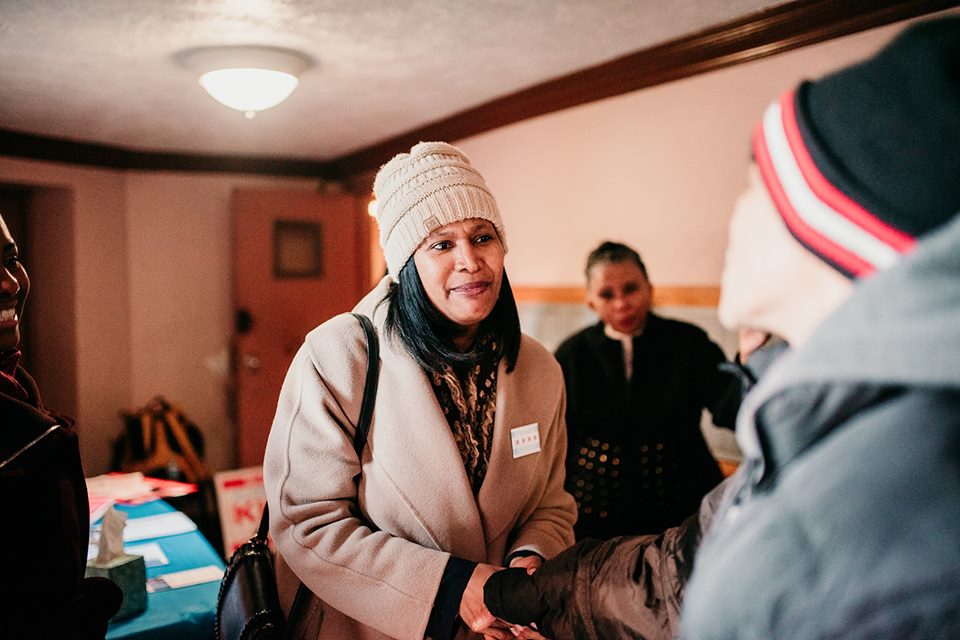
What was your opinion of South Side residents asking for a community benefits agreement regarding the presidential library?
I haven’t been shy about this – I believe that there should be a CBA. However, we shouldn’t just end with a CBA. We should make sure that we create enforceable agreements between the city and the developer, and make sure we protect the interests of the community. These agreements must be codified and written into the redevelopment agreement.
With the Michael Reese redevelopment project, we are making sure that the community’s voice is heard and has benefits such as: strong minority participation (currently discussed at over 65 percent); a partnership and resources for Dunbar High School so that students will eventually be able to be hired and work on the site; rehabbing Pershing East Elementary; affordable senior and general housing; homage to Bronzeville in a significant way that will attract tourism and highlight our storied community; and incentives for local small businesses to grow, to name a few.
What will the new traffic plans/routes be for 4th Ward residents to get around once Cornell Drive is closed for the library?
Again, because this is in the 5th and not the 4th Ward, my understanding is more high level. However, I do not imagine it being more complicated than when the city moved northbound Lake Shore Drive to accommodate the expansion of the Museum Campus.
It is my understanding that Alderman Leslie Hairston has gone to great lengths to make sure that the impact is minimal on local residents. In addition, she has taken extensive steps to mitigate the impact the closure of Cornell Drive will have on daily commuters.
They will reconfigure traffic flow in the area where the Midway meets Stony; there will be a reconfiguration of Cornell and Stony from 65th to 67th to accommodate the closure of northbound Cornell; and there will be improvements made to Lake Shore Drive and Hayes Drive to accommodate the diverted traffic.
For how long, and in what capacity, do you know Michelle and Barack Obama?
I consider President Obama and the former First Lady, Michelle Obama, friends. My family was very fortunate to have a close seat to an extraordinary moment in history. However, we knew them long before they were well known to others. I am very proud of their accomplishments individually and as the First Family.
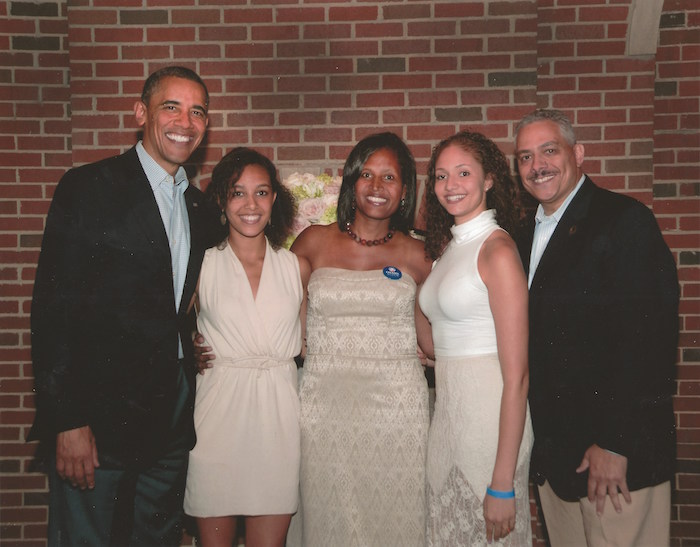
When you were selected to fill Will Burns’ term, why did you want to get into politics?
I didn’t initially see myself in politics. However, I have always been drawn to helping others and had done so in various capacities throughout my 30 years in the 4th Ward before becoming alderman. Friends convinced me that many of the things I had done would suit me in serving my community as alderman.
They mentioned my experience as a small business owner, my roles in helping to start a small neighborhood school, as well as non-profits for gun-violence prevention and increasing jobs and wealth in the African-American community. As I began to explore the opportunity, I became energized by the prospect of being able to leverage the position to further help our community. They were right. It’s a good fit. I love my job and the opportunity it affords me to help even more people.
Now that you’ve been an appointed and an elected official, what do you think about politics now? Is it easier or harder than you thought?
An alderman is the most public facing political job you can have. If you do not like people and helping people this is not the job for you. You have to want to help people more than having the job itself. I love being alderman. It is a difficult but very rewarding job that has allowed me to resolve issues that have plagued blocks for years and introduce initiatives like renaming Congress Parkway to Ida B. Wells Drive, which will inspire young people for years to come.
What was your opinion of Rahm Emanuel as mayor?
I appreciate his service to the city of Chicago and wish him well in his next chapter. I would like to correct recent reports that erroneously have my voting record combined with my predecessor’s. They incorrectly list me voting 98 percent with the Mayor. A U of I study has my percentages closer to 85 percent. To put that in context, they report that 37 of the 50 aldermen voted 90-100 percent of the time with the administration, so my percentage is among the lowest.
What would you like to see out of a new mayor that Rahm Emanuel maybe did not provide?
The new mayor has to be someone that recognizes the importance of bringing resources to all of our communities, especially to those that have been traditionally left behind; has the ability to understand the importance of downtown and the business community as an economic engine and yet also appreciates how to build vibrant communities with strong neighborhood schools, which in turn creates economic development.
That person must also have the foresight to truly celebrate the diversity in our city by putting all of Chicago back to work. Chicago celebrates a diversity of approximately 70 percent Black and brown people. They also pay the taxes that help make up our almost $10 billion budget. But their return on their investment is abysmal.
We must shift the paradigm on how our money is spent. It is not a handout when it comes to our community and it should come back to our community with the same fervor in which it leaves. We must prioritize and bring more parity to how we spend precious taxpayer dollars that help create our budget and infrastructure and development projects.
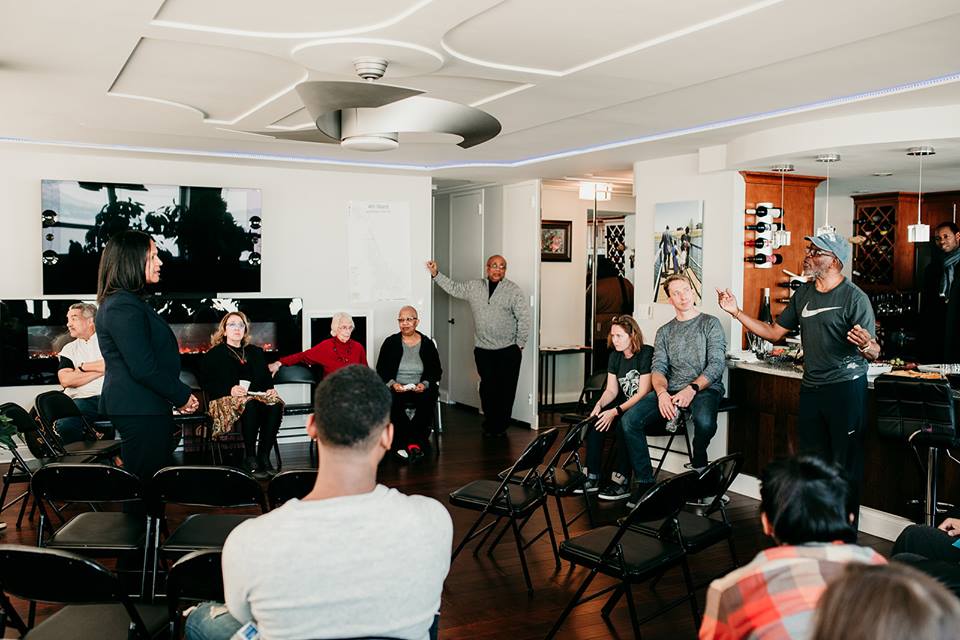
Do you favor an elected or appointed school board and what would you like to see happen with the 50 schools that were closed under Rahm Emanuel’s tenure?
I’m in favor of an elected school board. As for the 50 schools that were previously closed, I think each community should determine what’s best. However, I believe that closing the schools for the most part was short-sighted, and that every community should have a strong viable neighborhood school at every level. In the 4th Ward, we stopped two schools that were closed prior to my tenure from being sold. It is my plan that we totally rehab, restore, and rebrand these schools into new neighborhood options in the community.
As an alderman for a while now, do you have any idea what the city intends to do with the empty land on the South Side left vacant by the demolition of the public housing projects?
Many of those sites are part of CHA’s Plan for Transformation. It has been 20 years since this program started, but many of those sites are slated for mixed-income communities, several of which have a retail component to them.
A prime example is the Oakwood Shores Development in Bronzeville, which used to be the former site of the Madden/Wells housing development. The Oakwood Shores development is the home of the new Bronzeville Mariano’s and the mixture of townhomes, apartments, and condos that include CHA, market rate and affordable housing.
There are still a significant number of units still being planned for the site. In preparation for the future phases of the site, the developer held a number of meetings in 2017 and 2018 to get community input on the final phases of development. Now that the updated master plan for the site has been completed, I look forward to filling in the gaps in the development that will continue its success.
What would you like to see done with that vacant land?
I am committed to building public housing replacement mixed-income housing. I want the development in my ward to reflect the rich tradition of Bronzeville, and at the same time reflect a healthy mixture of housing and retail that everyone can be proud of in the 4th Ward.
Do you think that a new mayor should keep Eddie Johnson as Police Superintendent?
Superintendent Johnson took the helm during a very difficult time and has made many strides in community policing and reducing gun violence and crime in general, in a relatively short period of time. A new mayor will have new priorities and goals. They should certainly sit down with this superintendent to determine the best course forward for the city.
What types of measures can you personally take, and Black aldermen as a group take, to curb the violence in the city?
There is a direct correlation between concentrated poverty and crime. Violent crime is a symptom of broader issues that need to be approached holistically. Access to strong public neighborhood schools, jobs and strong mental health care are essential parts of this unbalanced ecosystem.
We need more co-curricular programs that engage our children and keep them off the streets. We have been able to help some of our neighborhood schools with resources for co-curricular programs such as soccer and chess. Addressing these disparities will help mitigate crime.
We have enough resources in our city to make sure that all of Chicago is working. We should make it a priority to spend our billions of dollars in our own city first so that more Chicagoans and people of color have opportunities and aren’t forced to create alternative economies.
We need to address the disparity in resources in our community, in our neighborhood schools, in the Park District, in policing and across city government. We must demand our fair share of jobs and contracts and increase goals and outcomes to get those jobs. Bringing parity to how those resources are distributed and diversity and training in the workforce is important as well.
Demanding more accountability from our police is important. In Chicago, the clearance rate for murders is abysmally low – less than 20 percent – and it’s even lower in Black and brown communities. The national clearance rate is about 60 percent. We have to demand better.
We were able to introduce a Safe Summer Initiative, which extended Safe Passage into summer for the first time. It brought jobs, youth engagement and collaboration with police to improve safety during the summer months. We have also worked to establish more block clubs to increase communication block by block.
In addition, we have worked with blocks to close bad businesses and buildings. We are also demanding more accountability and resources from our police through monthly meetings with our commanders, driven by our office.
Furthermore, we need to allow people with non-violent drug crimes to be able to be active citizens again. Most are being held in our jails before conviction for long periods of time because they cannot make bail, while violent gun offenders are back on the street.
We need wrap around services to help children in bad situations get the support they need. Finally, we need restorative justice programs in Chicago Public Schools to end the school to prison pipeline.
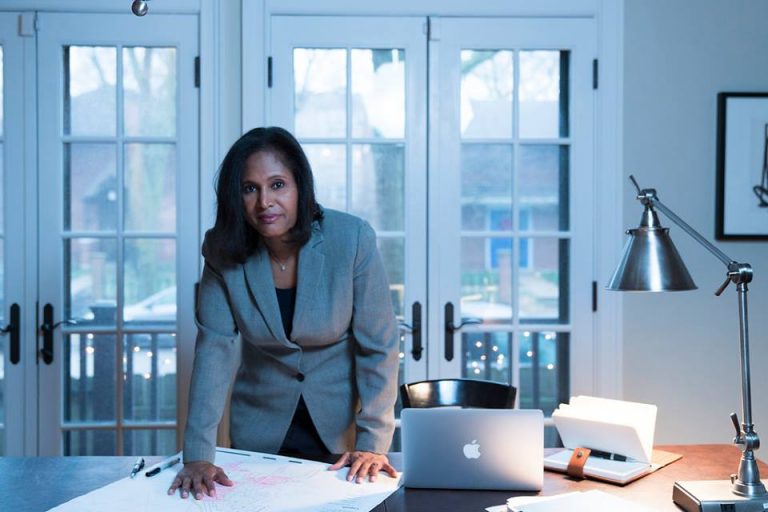
How do you see the city’s finances and what can be done to put Chicago on more sound financial footing?
There is no hiding the financial struggle our city has been dealing with in recent times. One of the most pressing issues at hand is the pension obligation facing the city’s workforce. There have been talks about a constitutional amendment to lower the 90 percent funding requirement the state currently is struggling to reach.
While I do believe we can reduce the burden on our city’s finances by lowering this percentage, I strongly believe this should only be applied to new hires, and that all current employees should still receive their promised 90 percent funding levels. There are a lot of ideas for new revenue that I support, like a progressive income tax, a transfer, tax and revenue from the legalization and sale of marijuana. Of course there should then be full pardons and expungement of records for all convictions for use and sale of marijuana.
What’s something that people generally don’t know about you personally?
I spent some of my formative years growing up in Mississippi. I’m an avid lover of sports; basketball, tennis, running, you name it.
Is there a book or three that has helped guide your life?
Warmth of Other Suns
Ya Ya Sisterhood
Kindred
Bre’r Rabbit Tales
Do you follow/favor any particular quotes or affirmations?
First Corinthians 13:1 – If it’s not said in love, it’s just noise. (My interpretation!)
What do you do for fun?
Hang with my family and girlfriends, run, play tennis and bid whist.
What’s your favorite Chicago place(s) to eat?
Virtue, Two Fish, Some Like it Black, Valois, Norman’s Bistro and Taste 222.
What’s on your music playlist?
Janet Jackson, Vic Mensa, James Taylor, Drake, Cardi B and Yo-Yo Ma.
Anything you wish to add?
In my short time as alderman, we have achieved major initiatives that have affected blocks for years and initiatives like Ida B. Wells that will inspire young people for years to come.
I am very proud to have led the charge to rename Congress Parkway to Ida B. Wells Drive. This is the first street downtown named after an African American or woman. And the first street renamed since South Parkway was changed to Dr. Martin Luther King Jr. Drive 50 years ago.



